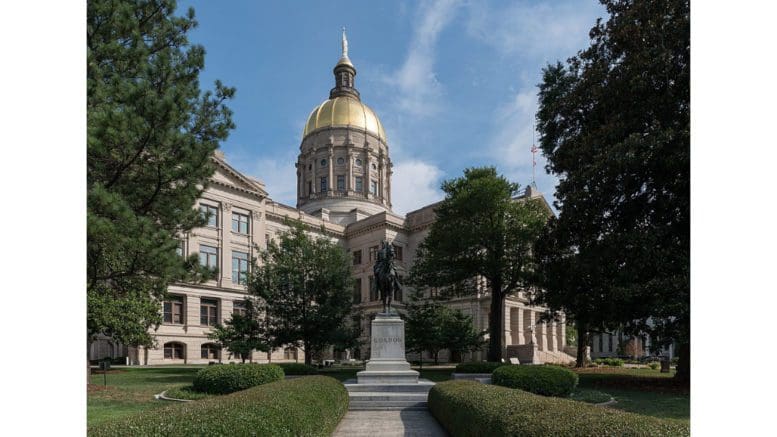by Jill Nolin, Georgia Recorder [This article first appeared in the Georgia Recorder, republished with permission]
March 2, 2022
Georgia House Republicans unveiled a $1 billion tax cut package Tuesday on the same day their GOP colleagues approved the governor’s proposed $1.6 billion plan to send some of the state’s surplus revenues back to taxpayers.
Speaker David Ralston and the bill’s sponsor, state Rep. Shaw Blackmon, who chairs the Ways and Means Committee, announced the plan at a press conference hours after they backed Gov. Brian Kemp’s one-time refund plan. The proposal faces a tight deadline to pass before a key deadline two weeks away.
Ralston pledged in January to pursue “responsible tax relief” even as some statewide GOP candidates are campaigning on a pledge to completely eliminate the state’s income tax, which funds nearly half the state budget. He said Tuesday such proposals would “blow a catastrophic hole in the budget.”
“I know it doesn’t fit on a bumper sticker quite as well, but I think it is the responsible way to do that,” Ralston said of the House GOP’s plan.
Blackmon’s bill would, however, toss out the graduated six-step income tax rate the state currently uses – and which now tops out at 5.75% – and replace it with a lowered and flattened 5.25% rate on all income.
The Bonaire Republican also said his proposal wraps many of the state’s existing exemptions into a higher $12,000-single and $24,000-married couple standard exemption. The higher exemption, he said, is intended to offset any tax increase on lower-income Georgians caused by the proposed flat tax.
“We believe this tax cut will make us more competitive for wage earners at every income level,” Blackmon said. “This plan lowers the rate and significantly raises the standard exemption. It’s simple, it’s fair, and it allows Georgians to keep more of their money.”
State revenues have jumped in Georgia after an initial dip early in the pandemic when the economy was brought to a sudden standstill, leading lawmakers to pass budget cuts last summer.
Collections were up nearly 18% for the fiscal year as of last month. Last year, the state was left with billions in surplus revenues when the fiscal year ended June 30.
Gov. Brian Kemp has responded to those surging revenues with growing budgets, including a $30.2 billion spending plan for next year that is about $3 billion larger than this year’s budget as originally passed. The governor has packed into the budget costly salary hikes for teachers and state workers.
If passed, the proposed tax cuts announced Tuesday would not take effect until 2024.
Ralston touted the proposal as the largest income tax cut in Georgia history. Lawmakers reduced the top rate from 6% to 5.75% in 2018 with plans to reduce it again in 2020 before the pandemic upended the economy.
Lawmakers came back last year and raised the standard deduction, resulting in a small tax break.
“We believe as a core principle the government must live within its means, that there is no such thing as government money, but that it belongs to Georgia taxpayers,” Ralston said.
Revenues have so far shown no sign of slowing, although the state economist did forecast in January that the growth could soon slow to “more normal pace.”
Kyle Wingfield, president and CEO of the conservative Georgia Public Policy Foundation, called the proposal a “good next step” toward lowering the income tax rate enough to compete regionally. He also called the state’s current six-bracket system “needlessly complicated.”
“We’re in a tough neighborhood when it comes to tax rates,” Wingfield said Tuesday. “I think from a competitiveness standpoint, there’s definitely a need to do something here.”
Georgia is sandwiched between two states – Tennessee and Florida – with no income tax. North Carolina recently approved a gradual reduction of its rate, and South Carolina lawmakers are currently debating tax cut proposals.
“We do believe they’re in a position to take another step, go farther than they originally planned to in 2018, and hopefully set the stage for some further cuts. It makes sense in a lot of ways to take a series of smaller bites rather than one huge bite all at once,” Wingfield said.
But critics are already urging lawmakers to reconsider the proposed move to a flat tax. Danny Kanso, senior policy analyst with the Georgia Budget and Policy Institute, called the flat tax “dangerous” and warned it could dull the potential benefits of the rest of the proposal.
“The recent volatility in Georgia’s revenue collections that only months ago forced billions in budget cuts demonstrates the necessity of preserving our state’s ability to fund health care and public education without overtaxing low- and middle-income families, who are disproportionately people of color,” Kanso said.
“Lawmakers can improve the proposal and rebalance the tax code by rejecting the flat tax, eliminating and capping wasteful corporate subsidies offered through the tax code, such as the costly Film Tax Credit, pursuing commonsense revenue raisers — like lifting the tobacco tax to the national average — and adding a refundable Earned Income Tax Credit.”
$1.6 billion tax refund plan clears the House
The tax cut plan will also likely encounter pushback from those who would like to see the state spend more of the money on services.
Rep. Josh McLaurin, a Sandy Springs Democrat, questioned why the state was returning $1.6 billion of revenue to taxpayers when state agencies are combating high employee turnover rates and other challenges.
“Would you agree with me that currently our government does not have the money it needs to operate at a basic level and that this type of measure is giving away money that actually the government does need to function?” said McLaurin, who voted against the bill.
That proposal, sponsored by the governor’s floor leader, Rep. John Bonner, a Fayetteville Republican, would send back $250 for single filers, $375 for head of household, and $500 for married couples filing jointly.
“I would submit (that) the government would spend every dollar that they take out of the taxpayer’s hands,” Bonner said in response. “I think it’s important that when opportunities are available to us to return that money, we do that.”
The bill cleared the House with a 148-18 vote Tuesday and goes to the Senate for consideration. This week, the House also unanimously approved a bill that would exempt up to $35,000 a year of military retirement income from the state income tax.
Georgia Recorder is part of States Newsroom, a network of news bureaus supported by grants and a coalition of donors as a 501c(3) public charity. Georgia Recorder maintains editorial independence. Contact Editor John McCosh for questions: info@georgiarecorder.com. Follow Georgia Recorder on Facebook and Twitter.




